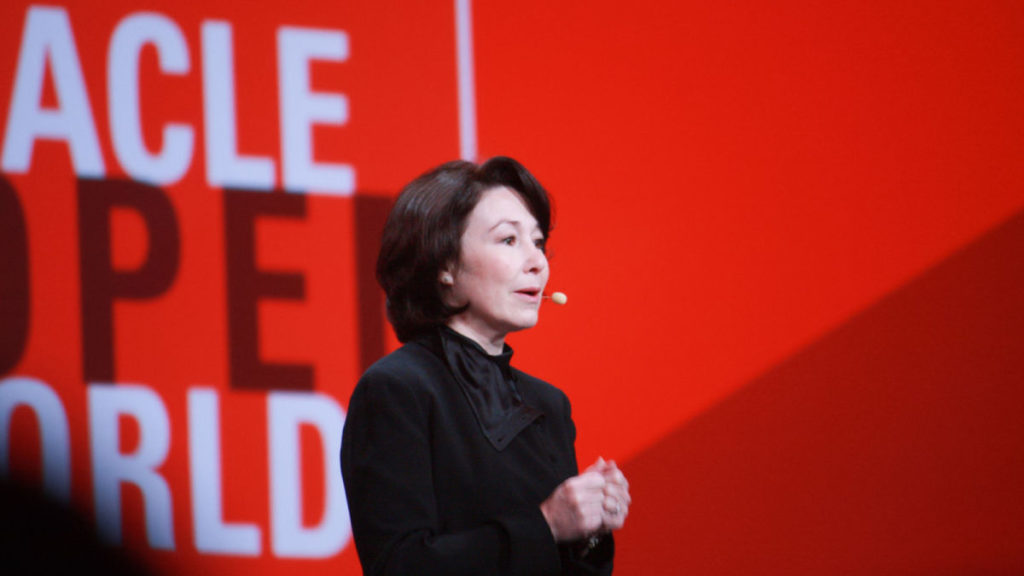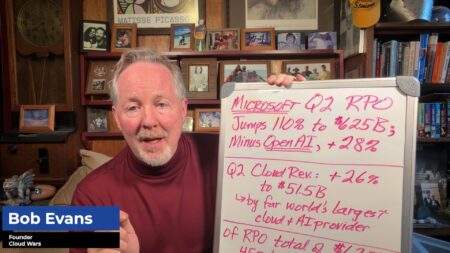
“I like it when people say they don’t understand what we’re doing at Oracle,” Safra Catz told me recently.
“I feel like I’m a cat with one little parakeet feather sticking out of the corner of my mouth, and I’ve got a big smile on my face because it’s like, ‘Yeah, I know something you don’t know!'”
For 23 years, Catz has known more than a few things that others either didn’t know or professed not to understand, and today — after her company’s been called a dinosaur and out of touch and unwilling to adapt and unable to compete in the cloud and other such nonsense — that cat’s got the big smile going because Oracle has become the fastest-growing major cloud vendor in the world. With cloud revenue for the quarter ended Aug. 31 up 45%, Oracle’s far out in front on the Cloud Wars growth chart, well ahead of SAP at 38% and Google Cloud at 37.4%.
Accordingly, Safra Catz — immigrant, former CFO, and for many years the low-profile but high-impact operational powerhouse behind Larry Ellison’s throne — is the Cloud Wars CEO of the Year for 2022.
To help convey how Catz has helped lead Oracle on this remarkable ride to the top of the Cloud Wars growth chart, two anecdotes capture Catz’s disarming humility as well as her fierce competitiveness.
The Self-Effacing Catz
From 2010 to 2014, Catz and the late Mark Hurd held parallel titles of president within Oracle, as Catz oversaw finance and operations, and Hurd ran sales and marketing. In 2014, when founder Larry Ellison relinquished the CEO title to become executive chairman and CTO, Catz and Hurd were both given CEO titles but retained their original areas of responsibility.
That changed tragically late in 2019 when Hurd died after a long illness. At that point, Ellison, Catz, and the Oracle board decided Catz would become the sole CEO.
During a 1:1 conversation I had with Catz at the recent Oracle CloudWorld event, here’s how she described that transition.
“Oracle’s kind of invisible to a lot of people, so the only way people see what Oracle’s doing is in the success of our customers,” Catz said.
“And after we lost Mark, all of a sudden, I was responsible for sales. Well, what do I know about that?
“But what I do know is being a customer, and what it takes to run a back office. And I learned that, as a cloud company, we don’t just sell you something and say, ‘See ya — good luck with that — call us if you need us!’
“And now it’s not ‘I just sell you something’ — instead, it’s ‘My stuff runs that company — that’s my responsibility. And if I go down, their business is ruined,” Catz said. “Again, necessity breeds innovation — I didn’t know any better, so that’s what I did as head of sales.”
Well, I hope Safra Catz will forgive me for disagreeing with her contention that “I didn’t know any better, so that’s what I did as head of sales.” Catz’s range of knowledge is staggering (I worked at Oracle from 2012 to 2016) and her ability to relentlessly assimilate what’s going on in the outside world with how Oracle needs to change internally is equally striking.
So, while there’s no question that Catz had not been formally in charge of sales before the passing of Hurd, it’s hard to fathom that “she didn’t know any better”—that’s the disarming humility side of Catz.
But that humble aspect is fused with an intensely competitive nature and an unshakeable focus on winning — particularly when, as in the parakeet-feather story, competitors and assorted know-it-alls dismiss Oracle as some gilded fossil trapped in the technological amber of the 1990s.
The Fierce Competitor
Oracle’s emergence as a very serious competitor in the cloud-infrastructure business has been a surprise to most people because the incumbents — Amazon, Microsoft, and Google Cloud — have been viewed as unassailable because of their resources and the early-mover status each enjoys.
But in the face of that well-entrenched competitive challenge, Oracle has separated itself from the vaunted “hyperscalers” by developing second-generation cloud infrastructure that’s allowing its customers to do things its competitors cannot offer.
“The intelligence agency of one of our allied countries was in to see us, and they needed us to drop a [cloud-infrastructure] footprint with all types of services. They’d gone to everybody else. And we said, ‘No problem!’
“And we designed this so we can drop a small footprint at the start — small, but not crippled, which is what some of those others would have dropped. Ours would include all services, and either connected or disconnected — and again, those others can’t do any of that. And from there we can scale.
“So, our competitors actually said,” — Catz stopped here to laugh, which she did frequently throughout the interview — “‘It’s not possible.’ Now, you know you have them on the ropes when they’re saying that what you do —and we can point to it up and running in dozens of places! — is simply, ‘not possible.’
“And we said, ‘Not only is it possible, but we’ve actually dropped this footprint at a customer site with all the services — not just Exadata Cloud@Customer or Autonomous Database — all of the Oracle services this agency needed.
“But I love that: ‘That’s impossible.’ Okay — great — go with that — because yes, it’s clearly not possible the way you guys think!”
Oracle’s ability to drive high levels of technological innovation in a field of extremely aggressive and capable competitors inspired this impressive testimonial to Catz’s leadership from a legend in the advanced-technology space who sent this perspective on Catz via email.
“Industries around the world need big things from technology companies,” said Jensen Huang, CEO of NVIDIA. “Oracle has a long and storied history of delivering solutions to customers that enable them to leverage data, compute, and automation to optimize their businesses.
“Under Safra, that relentless focus on innovation has continued, and we’re excited to see the impact that Oracle’s contributions in artificial intelligence (AI), machine learning (ML), and other next-generation technologies will have on today’s enterprises as they prepare for a digital future.”
Oracle’s aggressive deployment of those “next-generation technologies” to which Huang referred has been a primary factor in making Oracle the fastest-growing major cloud provider in the world. It’s led to a high-level product/market fit that caused Catz to say, “Sometimes, you just feel like you just hit the jackpot.”
What does that jackpot look like for Oracle today?
In its fiscal-Q2 results released yesterday, Oracle revealed another blowout quarter for its cloud business along with impressive strength across the company. Here’s a quick snapshot of the cloud results for the fiscal quarter ended Nov. 30:
- total cloud revenue up 43% (48% in constant currency) to $3.8 billion;
- cloud infrastructure up 53% (59% cc) to $1.0 billion;
- SaaS (software-as-a-service) revenue up 40% (45% cc) to $2.8 billion;
- Fusion Cloud ERP up 23% (28% cc) to $600 million;
- NetSuite Cloud ERP up 25% (29% cc) to $600 million.
Pretty impressive numbers — and a high-level Oracle executive who’s worked directly with Catz for more than 20 years says her fingerprints are all over those outstanding results.
“The accelerating cloud momentum and financial results Oracle has achieved during Safra’s tenure is a testament to her unparalleled business acumen, her willingness to take decisive, bold action, and her strong leadership,” said Doug Kehring, Oracle executive vice president of corporate operations.
“Our position in the market and ability to drive customer success have never been stronger,” Kehring added. That comment reflects two of the areas in which Kehring has worked very closely with Catz in dramatically changing the character of the company: leading the Corporate Development team that did 140 acquisitions across 15 years, and transforming the culture to reflect Oracle’s status as a cloud-first tech company.
In parallel with that internal transformation, Catz has helped major corporations across the globe use the power of the cloud to become modern digital enterprises, according to Accenture chair and CEO Julie Sweet, whose company is both an Oracle customer and strategic partner.
“Under Safra’s leadership, Oracle has helped to power the cloud transformation of many of the world’s largest enterprises,” Sweet said in an email message for this article.
“Safra understands the challenges that clients face and brings the technical and organizational expertise to help them thrive. We look forward to many more years of close collaboration.”
On that subject of close collaboration, I asked Catz to describe her working relationship with Ellison across almost a quarter-century of nonstop change and upheaval at the highest levels of the technology industry.
“After we lost Mark, and I became sole CEO, a lot of people were like, ‘Oh, Safra, you’re in charge —just you!’
“And I said, no way! You know how we operate at Oracle. Just in case there’s any confusion: Larry Ellison and I are still working as closely together as ever. He’s not sailing, he’s not doing any of those things — he’s working so hard!
“So as much as the sales force is under me, everything is a joint discussion and a joint decision because it’s about strategy. It’s about what the strategy is, and how are we gonna sell, and how do we impart the ‘One Oracle’ feel to our customers and yet also specialize in whatever it is that they at that moment need? And then how we work that into the sales force.”
Over the past quarter century, that long and remarkable relationship with Ellison — can anybody name a leadership combo at this level that’s lasted even half as long? — has been tested by market upheavals, merciless technology transitions, and relentless competition. All of which, Catz said, have combined to shape Oracle for the challenges it faces today from incredibly big and wealthy competitors such as Amazon, Google, and Microsoft.
“Remember: Back in 2001, the internet bubble imploded on all of us, okay? And we at Oracle were one of the ‘Four Horsemen of the Internet’—Sun was one of them, EMC was one, and Cisco. And believe me, there were some companies eating their horses, okay? It was not pretty! Our horse made it, but he was limping pretty badly, okay?
“Back in those days, one of our financial numbers was ‘new-license revenue,’ and it dropped by a third. But we didn’t do those mass layoffs — in fact, we had a 15% higher R&D [research and development] headcount in 2003 than we did in 2001.
“And guess what happened? All those guys who cut their R&D, which is exactly what you do in times of squish and in times of starvation — you cut R&D because the results of that R&D don’t show up for two years.
“But those two years eventually come — and that’s when we started buying everything,” Catz said in reference to Oracle’s extensive string of acquisitions that made it a major player in the applications business.
Oracle’s longtime primary mission might surprise you
In the course of our conversation, Catz at one point mentioned 9/11 and the major role Oracle played in helping government agencies and the Pentagon maintain operations. I asked her how that crisis shaped Oracle’s culture, and if she believes the company still has that same sense of purpose.
“Keeping America safe — and keeping Americans safe — has always been the main mission of this company,” she said.
“Whether it was working with the different agencies of the United States government — in fact, at the Pentagon, some of the folks that were hit were our friends and so they moved their stuff to our building. TSA [Transportation Security Agency] started in our building.
“So, if there’s a national emergency? Count us in! And with COVID, right away, it’s just the nature of the people at Oracle and we were like, ‘We want in on this mission’ and they said, ‘Okay but you won’t be sleeping for a week’ and we said again, ‘We want in.’
“And we feel like we have a really mission-driven company. And some people will say that it’s a less-important mission to make sure some business’s accounting system works — but in fact, those are really important, too, especially to all the people in that company and their customers and their suppliers!
“So, making sure this stuff is up? Yeah, we still take that really seriously!”
That sense of unconditional commitment that Catz wants Oracle to apply to all of its customers was fortified by the global challenges raised by the COVID pandemic, she said.
“I’ll tell you very honestly: I think the pandemic was profound for us at Oracle. Yes, we jumped in and were writing applications for the government, and Larry talked about that. But what you don’t know is behind the scenes, we were on calls every day about COVID: what could we do, what do you need, how can we help you?
“Whether it’s throw up all those clinical trials, or build some of these systems as the whole thing was evolving.
“And that all told us, ‘Yeah, we still got that!’
“Later, after Larry’s keynote, I talked with him and a few board members, and he said he’s really been influenced to think bigger. Think bigger! And it’s just kind of permeated all of us: ‘Why are we wasting time? Do it now!’ ” Catz said as our discussion wound down.
“Here’s an example: We recently had an internal sales-organization meeting and I walked in late—I did that on purpose because I wanted to let them decide things and get options ready—and they were like, ‘Yeah, we’ll start X on June 1st.’ And I said, ‘June 1st?!? Aren’t we in October??’
“So that’s what we’re doing. I feel like we need to just get there already: just be bold and make the decision. Look — we all saw it during the pandemic: Companies who did not adjust are gone.”
They say hindsight is 20-20, so perhaps it’s easy to ridicule some of the self-proclaimed experts who’ve been saying, over and over again, that Oracle’s time has passed, that it’s a stranger in what is for it the very strange land of the cloud, and that it should just stick to old-fashioned databases and leave the cool cloud stuff to the cool new kids.
What might finally change the minds of those blowhards is the image offered by Safra Catz of a cat sporting a big smile while all that’s left of the parakeet is one little feather.
And if that doesn’t do the trick, then consider this: for 23 years, Safra Catz — the Cloud Wars CEO of the Year — has been shutting the yaps of skeptics and delighting customers and shareholders because, all the while, she’s been the one truly able to say, ‘Yeah, I know something you don’t know!’ ”
To see more Cloud Wars content, including all recorded sessions from June’s live Cloud Wars Expo, please register here for your Cloud Wars Expo on-demand pass. The on-demand pass, which is included with your Acceleration Economy subscription, gives you access to approximately 40 hours of invaluable educational content.









